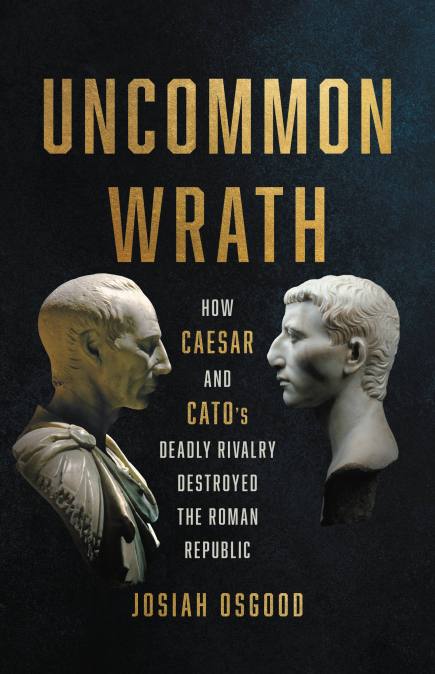Shopping Cart
Uncommon Wrath
How Caesar and Cato’s Deadly Rivalry Destroyed the Roman Republic
Description
A dual biography of Julius Caesar and Cato the Younger that offers a dire warning: republics collapse when partisanship overrides the common good.
In Uncommon Wrath, historian Josiah Osgood tells the story of how the political rivalry between Julius Caesar and Marcus Cato precipitated the end of the Roman Republic. As the champions of two dominant but distinct visions for Rome, Caesar and Cato each represented qualities that had made the Republic strong, but their ideological differences entrenched into enmity and mutual fear. The intensity of their collective factions became a tribal divide, hampering their ability to make good decisions and undermining democratic government. The men’s toxic polarity meant that despite their shared devotion to the Republic, they pushed it into civil war.
Deeply researched and compellingly told, Uncommon Wrath is a groundbreaking biography of two men whose hatred for each other destroyed the world they loved.
In Uncommon Wrath, historian Josiah Osgood tells the story of how the political rivalry between Julius Caesar and Marcus Cato precipitated the end of the Roman Republic. As the champions of two dominant but distinct visions for Rome, Caesar and Cato each represented qualities that had made the Republic strong, but their ideological differences entrenched into enmity and mutual fear. The intensity of their collective factions became a tribal divide, hampering their ability to make good decisions and undermining democratic government. The men’s toxic polarity meant that despite their shared devotion to the Republic, they pushed it into civil war.
Deeply researched and compellingly told, Uncommon Wrath is a groundbreaking biography of two men whose hatred for each other destroyed the world they loved.
Praise
“[An] incisive and accessible dual biography of Julius Caesar and Cato the Younger focused on their shared responsibility for the Roman Republic’s downfall… Along the way, Osgood issues incisive warnings about the dangers of polarization that resonate with today’s political landscape and vividly describes the era’s religious rituals, military battles, and Senate debates… He builds a persuasive and entertaining case. Roman history buffs will be intrigued.”
—Publishers Weekly
"This well-written book, underpinned by profound erudition, deserves the widest readership."
—The Sunday Telegraph
“The story that Osgood tells so clearly, learnedly, and engagingly does indeed illuminate the lasting costs of polarised conflict. But it may also be in noticing and delineating the gulf between ourselves and the ancient world that we may adopt some sharper diagnostic tools for resisting the contemporary varieties of all-or-nothing stand-offs in politics – the confrontations that block the way to patient problem-solving for the sake of a common good.”
—The New Statesman
"A brilliant dual biography of Caesar and Cato: two titanic personalities whose fame illumined the death throes of the Roman Republic and continues to blaze to this day."
—Tom Holland, author of Rubicon: The Last Years of the Roman Republic
“Lively, literate, and readable, Uncommon Wrath is all that you could want in a book on one of the most destructive feuds in history. As Osgood recounts, Cato and Caesar’s refusal to compromise did much to destabilize the Roman Republic. Informed by scholarship and executed with grace.”
—Barry Strauss, author of The War that Made the Roman Empire: Antony, Cleopatra, and Octavian at Actium
“The respective sagas of Cato and Caesar, always timely, seem even more so in today's America. Osgood’s interwoven retelling of their raucous and violent careers, and their impact on a tottering republic, makes for compelling reading.”
—Steven Saylor, author of Dominus: A Novel of the Roman Empire
"Osgood writes with great clarity… It takes skill to bring the reader as close to the complex events of the Late Republic as this… It is a sign of a good book when the ending comes as a pulse-quickening surprise – even to those who already know what is coming."
—The Critic
“A gripping account of the rivalry between Julius Caesar and Cato, two men at the heart of the political dysfunction that brought down Rome's Republic. This is the rare book that warns us about the dangers of the modern political moment while offering a nuanced and insightful analysis of the character of some of Rome's most famous leaders.”
—Edward Watts, author of Mortal Republic: How Rome Fell into Tyranny
“Uncommon Wrath is a riveting re-telling of the violent end of the Roman Republic. By restoring Cato to the center of the story, Osgood reminds us that this symbol of old-fashioned virtue was not just a myth, but a leader nearly as crafty as his hated rival. Here is a vivid and human-scale account, whose focus on partisanship and political rivalry makes for a resonant and all-too-timely reflection.”
—Kyle Harper, author of The Fate of Rome: Climate, Disease, and the End of an Empire
—Kyle Harper, author of The Fate of Rome: Climate, Disease, and the End of an Empire
